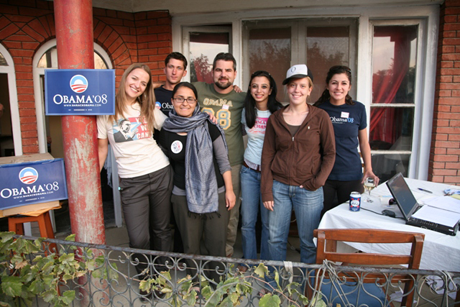 Renegades: Canadians in The Spanish Civil War
Renegades: Canadians in The Spanish Civil War, by Michael Petrou, 281 pages, softcover, $24.95. UBC Press.
They say history is always written by the victors, but that is not quite true. History is written by people who can write. So, just as there are reasons why roughly 1,700 Canadians sailed off to defend the Spanish Republic 70 years ago, no less important are the reasons why the job of telling their story honestly and properly has ended up falling, all these years later, to Michael Petrou, a 34-year-old senior writer for Macleans magazine.
To begin with the latter reasons: Unlike the American volunteers who fought in Spain, the Canadians had no Ernest Hemmingway, Martha Gellhorn or John Dos Passos to valorize them. Unlike the British, the Canadians had no W.H. Auden, Stephen Spender or George Orwell. Only 32 of the Canadian volunteers are known to have had any kind of post-secondary education.
And yet to Spain the Canadians went, to take up arms in defense of the Spanish Republic. Madrid's leftist government had been abandoned by the west's great democracies, left to fend for itself against several divisions of Spanish troops and 75,000 Arab mercenaries from Morocco, commanded by the Spanish general Francisco Franco. Another 75,000 soldiers, 660 aircraft, 150 tanks, and a trove of munitions were at Franco's disposal, provided by Italian dictator Benito Mussolini, and Germany's Nazi regime had sent in a further 16,000 soldiers, 600 fighter and bomber aircraft, and 200 tanks.
The Canadian anti-fascist volunteers were workers, "far more proletarian" than the British or the American volunteers, the Spanish War veteran Irving Weissman recalled years later. In Spain, they fought like lions. They fought barefoot and ate grass, and at least 400 of them never made it home. "They were very, very working class. The overwhelming majority – it was stamped on them," Weissman remembered.
They were not the sort of people who would end up as columnists for the Toronto Star, then, but there's more to it than that, and there's more to Renegades than anything that has been written on the subject before. It's not just that Petrou had access to the extensive and recently-opened Soviet files on the Canadian volunteers (Moscow's secret agents in Spain were obsessively suspicious about the Canadians) or that Petrou took pains to interview the handful of surviving volunteers. It's not just that Petrou is the first journalist to plumb the depths of the RCMP files on the volunteers, which the Mounties were updating as recently as 1980.
It's that from the beginning, the saga of the Canadian volunteers has been obscured by taboo and maudlin hagiography, and it's been recounted in a way that hollows out the core of the story. Down through 70 years of trade union pamphleteering, symposium-convening, veteran-honouring and folk-club singalongs, it has been as though there are some things that are just better left unsaid.
Until Petrou, no one delved too deeply into what William Beeching, the author of the gushing Canadian Volunteers: Spain 1936-1939, once privately described as the "Pandora's Box" of the story. But Petrou opens that box, and just one thing lurking inside is the embarrassing fact that even the fabled Mackenzie-Papineau battalion, named after the leaders of Canada's 1830s' rebellions, was a propaganda fiction. There was no Mackenzie-Papineau battalion until the Canadian volunteers themselves forced its establishment after having arrived in Spain to discover that it didn't even exist. And throughout the entire Spanish sojourn, the battalion was run almost exclusively by Americans.
It is no surprise, then, that Renegades, which Petrou began as a doctoral thesis at Oxford University, has not become the toast of the left-wing press in Canada, or that Petrou has not been feted by a national tour of labour halls across the country.
"There is, unfortunately, a moral bankruptcy in broad sections of the left today, in its inability to recognize real fascism if it's opposed to the United States or whatever," Petrou told me during a recent conversation. Although that has been true for some long while, it only offers a glimpse of why the story of the Canadian volunteers has been so inadequately told until now. It is a story of acute contemporary relevance. After all, it fell to those Canadian workers, particularly, to take up arms against fascism in the first place, years before Britain, the U.S., Canada, and the other western democracies recognized fascism for the global, existential threat that it was.
It helps to know that an astonishing number of the Canadian volunteers who set off to fight on the side of the Spanish republic were Vancouverites. At least as many came from Vancouver as from the much larger city of Toronto, and there were twice as many Vancouverites as there were volunteers from Quebec, the Maritime Provinces and Newfoundland, combined. One in four of the Canadian volunteers came from the sparsely populated western provinces, and at least 350 were British Columbians, almost all of them from Vancouver.
Similarly, among the thousands of international volunteers who made their way to Spain from a dozen countries, the Canadian contribution was out of all proportion to Canada's size. With a population ten times greater than Canada's, the United States managed to muster only twice the number of volunteers. From a country with five times Canada's population, the British volunteers numbered only a few hundred more than the Canadians. . .
Go Canucks.
That's from my essay on the Canadian contribution to the Republican cause in Spain, in the latest Vancouver Review (on newstands , or better yet, subscribe). The essay is largely a review of Mike Petrou's brilliant and moving book, which you should buy.






















